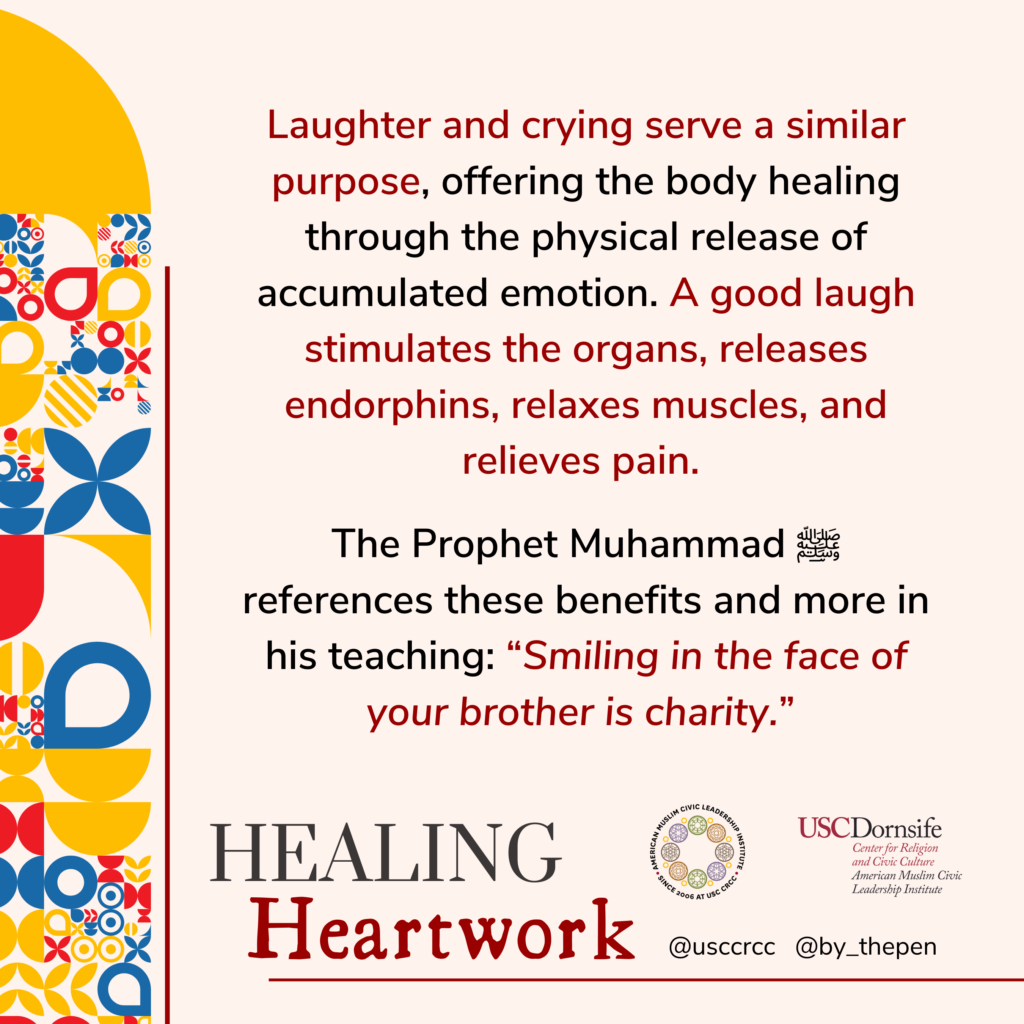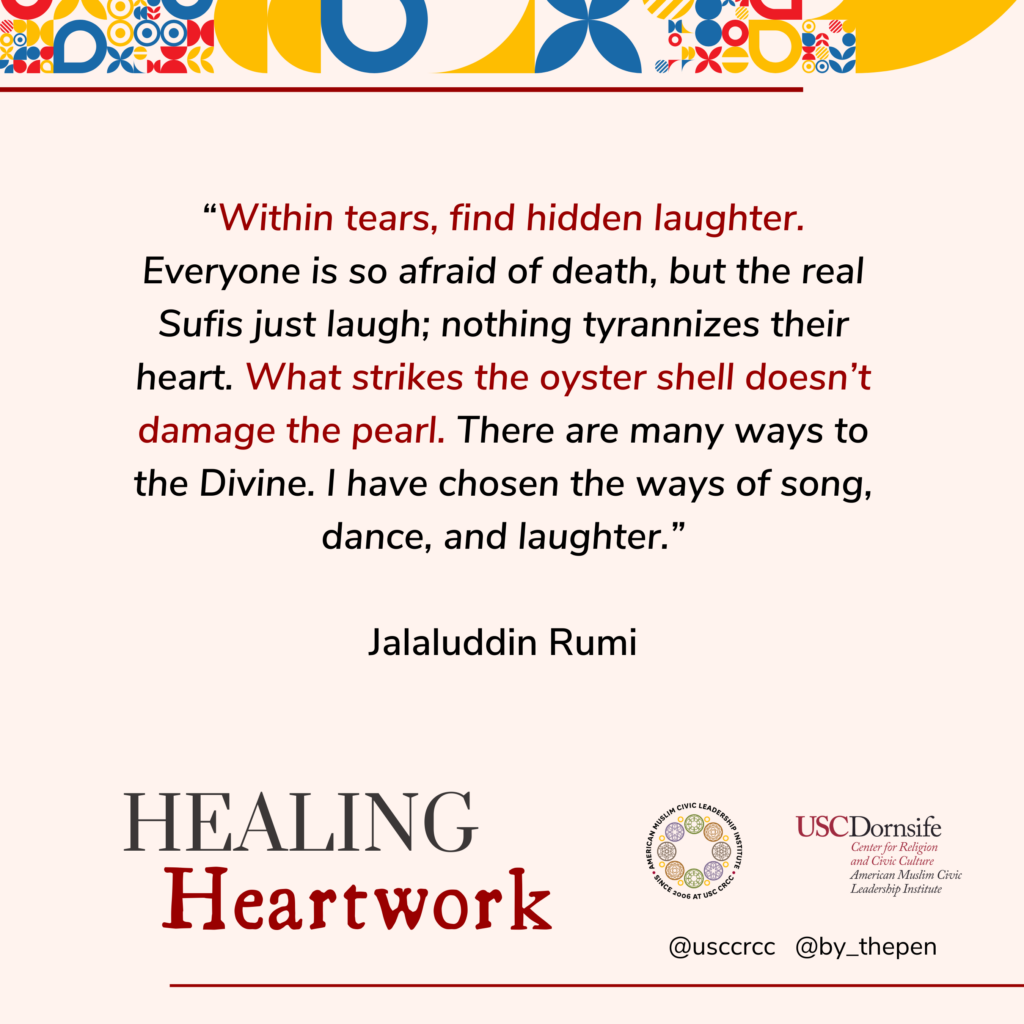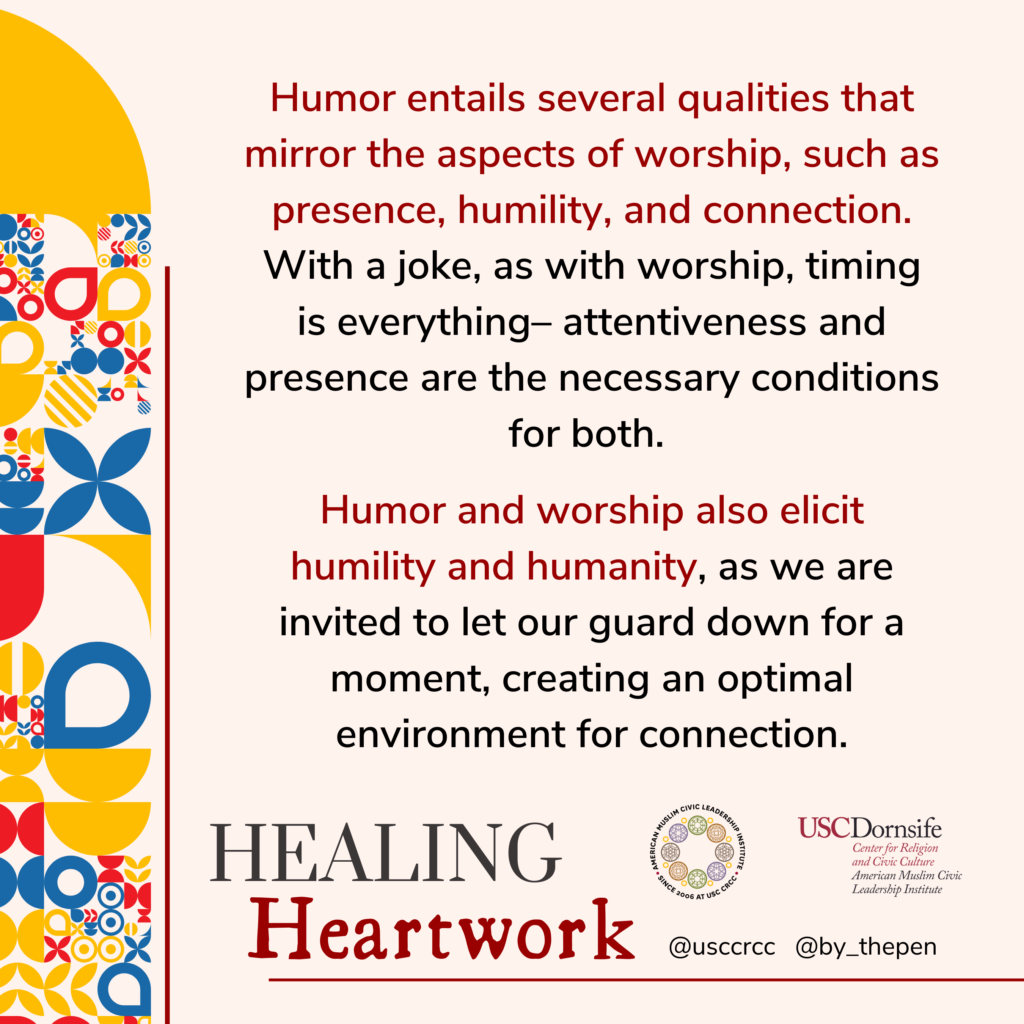I regularly meet with a patient who cycles through the hospital often due to chronic illness. Though she faces many challenges in her life, she quickly releases her emotions through crying and also has a sharp sense of humor accompanied by an endearing laugh. With every new hospital admission – some more critical than others – she and I joke that “we need to stop meeting like this.” Neither of us ignores the glaring reality of her multiple near-death experiences nor the ongoing grief of her two teenage daughters. But, if only for a few moments, we like to swap jokes about the mundane aspects of life. This space of humor and relative lightness provides her with a sense of safety amid the formidable presence of her severe chronic illness.
As the old saying goes, in life, you can laugh, or you can cry. The Quran affirms both options as gifts from God: “It is He Who causes people to laugh and cry” (Quran Surah An-Najm 53:43); however, unlike the old saying, the Quran verse joins the two options as collaboratives rather than as alternatives. Laughter and crying serve a similar purpose, offering the body healing through the physical release of accumulated emotion. A good laugh stimulates the organs, releases endorphins, relaxes muscles, and relieves pain. Even a smile produces similar healing results, invoking a contagious response from others.

The Prophet Muhammad ﷺ references these benefits and more in his teaching: “Smiling in the face of your brother is charity.” Just like any act of charity, we receive far more than we think we give. Offer a genuine, warm smile to a fellow human being conveys safety and builds community.
Smiling and laughter do not merely enhance physical and mental wellness. In Islam, smiling and laughter are signs of spiritual wellness, too. Happiness and contentment are the highest states that the human soul can reach, described in the Quran as “the soul at peace – well-pleased (with God) and well-pleasing (to God)” (Quran Surah Al-Fajr 89:27-30). The Prophet Muhammad ﷺ explicates this notion in a description of the believer as one who finds contentment and happiness in everything – prosperity and adversity – because the believer sees good from God in all of it. A seeker who has reached this level of happiness, separate from the fluctuating external circumstances of this world, will always be laughing and rejoicing in whatever situation he or she finds themselves.
This equanimity in the face of adversity is the essence of safety, as Jalaluddin Rumi captures so beautifully: “Within tears, find hidden laughter. Everyone is so afraid of death, but the real Sufis just laugh; nothing tyrannizes their heart. What strikes the oyster shell doesn’t damage the pearl. There are many ways to the Divine. I have chosen the ways of song, dance, and laughter.”

To experience God in only one dimension deprives us of the whole picture. A soul at peace knows God in the fullness of what is possible in this life – in ease and in difficulty, in lightness and in darkness.
Finding happiness in all that comes our way in this life also translates to everlasting happiness in the next life. Abu al-Darda al-Ansari, a companion of the Prophet Muhammad ﷺ, said, “Verily, one who keeps his tongue moist with the remembrance of Allah, they will enter Paradise laughing” (Ḥilyat al-Awliyā’ 1/219). Muslim sages teach that the most sincere believer experiences jannatayn, or “Two Paradises”: the paradise of this life, which results from the inner peace of an intimate relationship with God, and the Paradise of the Afterlife. Paradise, as described in the Quran, is the absence of fear and grief (Quran Surah al-A’raf 7:49) or, in other words, a place of true emotional, physical, and mental safety. Paradise in this life thus shares a portion of this experience of safety through the believer’s spiritual immersion in the Presence of God.
We humans often utilize practices such as worship and humor as ways to make the search for basic safety and survival richer and more holistic. Thus, in a practical sense, worship and humor are more similar than we think. Humor entails several qualities that mirror the aspects of worship, such as presence, humility, and connection. With a joke, as with worship, timing is everything– attentiveness and presence are the necessary conditions for both. Humor and worship also elicit humility and humanity, as we are invited to let our guard down for a moment, creating an optimal environment for connection.
When we see and hear our lived realities conveyed through comedy, we are able to laugh at the truths that jokes reveal about ourselves. For instance, in the Qur’an, when God asks Prophet Musa about the staff in his hand, Prophet Musa’s stumbling and rambling reply elicits a chuckle from the reader (Quran Surah TaHa 20:17). How many of us have found ourselves in a similar situation, responding to someone we deeply admire by putting our foot in our mouth? Whether through humor or in worship, we share a situation that others find themselves in too, and we feel a little less alone.
Humor needs at least two entities – the giver and the receiver – to function. Likewise, a community – whether between one person and another or between a person and God – also needs two entities to exist. Through humor, we cultivate a sense of safety that nourishes and strengthens the bond of community and fosters holistic healing and wellness.

Learning Activities: Holistic Humor

Chaplain Sondos Kholaki is an AMCLI fellow and guest contributor with the USC Center for Religion and Civic Culture.

